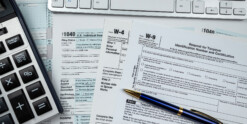Interest rates are on the rise. What does that mean for you as an investor?
Since hitting all-time lows, in July, interest rates have increased a full 1.0% over the past 5 months with much of the rise coming in the wake of the Presidential election as the markets began anticipating that President-elect Donald Trump would spur both economic growth and inflation. Many investors and pundits seem to believe these rising interest rates herald a bear market for bonds. That’s because when rates rise for an extended period bond prices decrease, as the two move in a seesaw or inverse pattern. Long-term bonds, those with 10-30 year maturities are more heavily influenced by interest rate changes than short-term bonds with 1-3 year maturities.
Setting our skepticism aside for a moment, large rate gyrations in the short and long-term do have wide-ranging implications for a balanced portfolio. So, let’s talk about how to invest in this climate.
My prediction for the bond market.
Predicting interest rate movements is a fool’s errand. That said… I’d like to offer a prediction. Rates will likely drift higher over the next few months as optimism swells over Trump and his pro-growth policies. That upward trend is further fueled now that the Federal Reserve has increased its benchmark Fed Funds rate.
But I’m inclined to believe interest rates will then moderate as investors realize there’s not a structural inflation problem yet, as real GPD and wage growth are simply too low. Longer-term, I suspect we’ll see a slow grind upwards as economic growth is limited by slow population growth and the debt loads that continues to hobble many households’ ability to spend.
And that’s a good thing, given that the economy will only tolerate higher rates to a point. The exact level is debatable, but for argument’s sake, let’s use the 3.0%-3.5% range accepted by most economists. At that point, inflationary pressures negatively impact corporate profits enough to lead the economy into a recession and drag rates lower.
Why you should still own bonds.
Put simply, in a period of rising interest rates, bonds will suffer. In fact, November marked the worst month for bonds in 12 years! Some context is needed here, however. The aggregate bond index fell 2.4%. The S&P’s worst monthly performance in 12 years? Down 16.9% in October, 2008. The worst year-to-date? Down 5.0% in January. My point is that bonds are meant to be owned for consistent income and to dampen portfolio volatility. We’d argue that the current post-election upheaval is a perfect illustration of why you should own bonds.
Stocks, on the other hand, will generally benefit from rising rates as they imply stronger economic growth. Cyclical sectors such as Financials, Industrials and Energy will do better, while the RUST (REITs, Utilities, Consumer Staples, Telecoms) sectors of the stock market will likely lag.
So, how should you be investing in the current climate? Easy – the same way you should always be investing. – by building a diversified portfolio made up of quality stocks and bonds that will pay you income through thick and thin. Very few (if any) people can accurately predict such market factors as interest rate tops and bottoms. The best we can do is build firewalls into our portfolios to limit the downside and increase potential upside as the market goes about its unpredictable business. That’s what well-executed diversification does – in this environment, and all others.
This article originally appeared on WesMoss.com.
Disclosure: This information is provided to you as a resource for informational purposes only. It is being presented without consideration of the investment objectives, risk tolerance or financial circumstances of any specific investor and might not be suitable for all investors. Past performance is not indicative of future results. Investing involves risk including the possible loss of principal. This information is not intended to, and should not, form a primary basis for any investment decision that you may make. Always consult your own legal, tax or investment advisor before making any investment/tax/estate/financial planning considerations or decisions.













